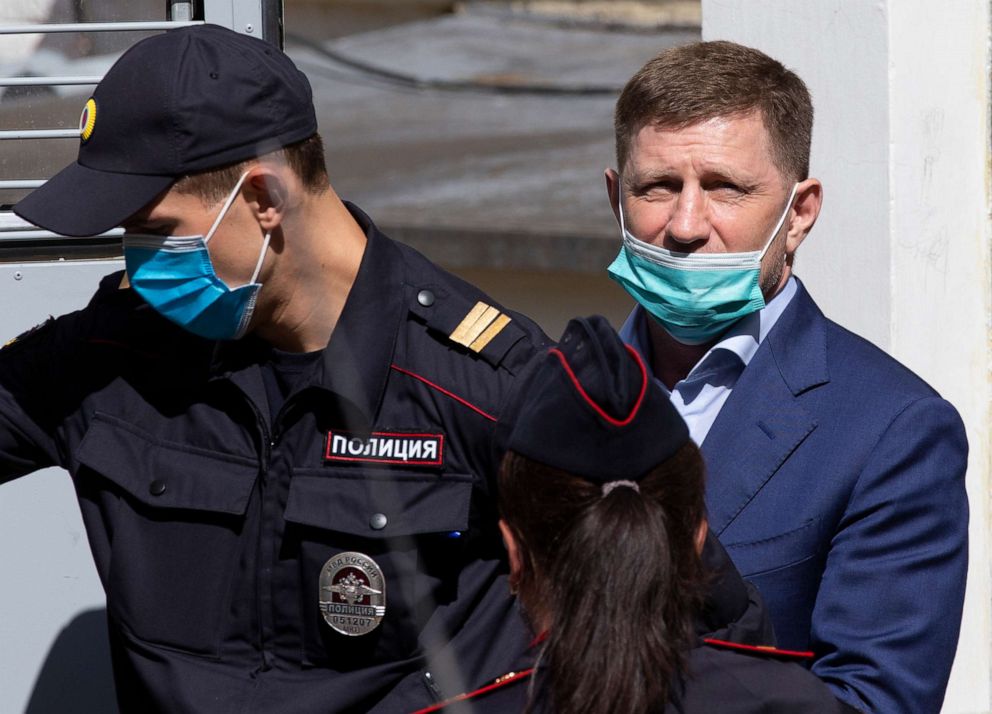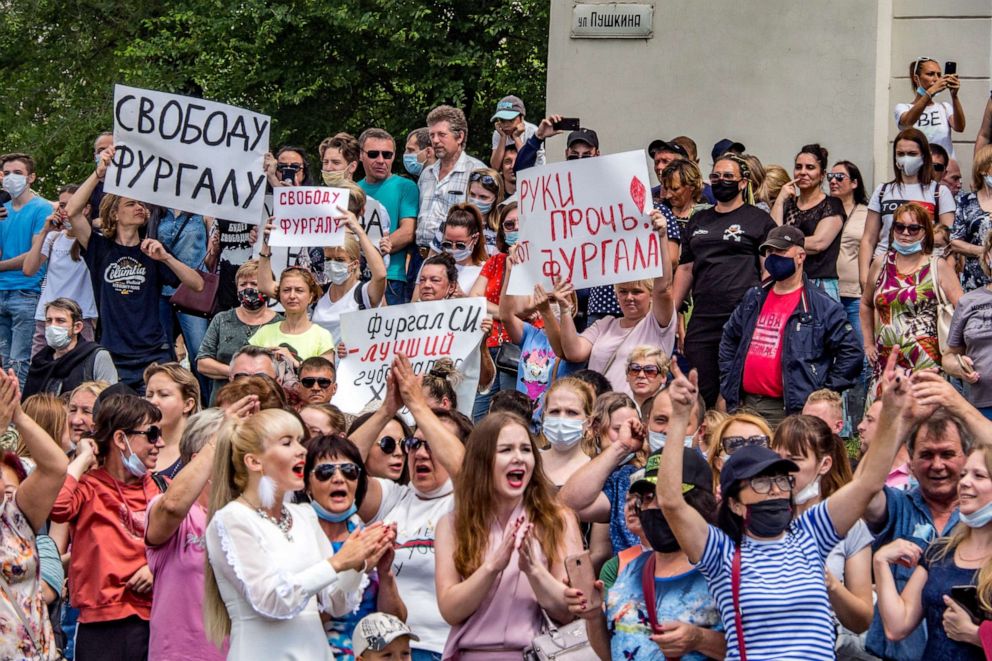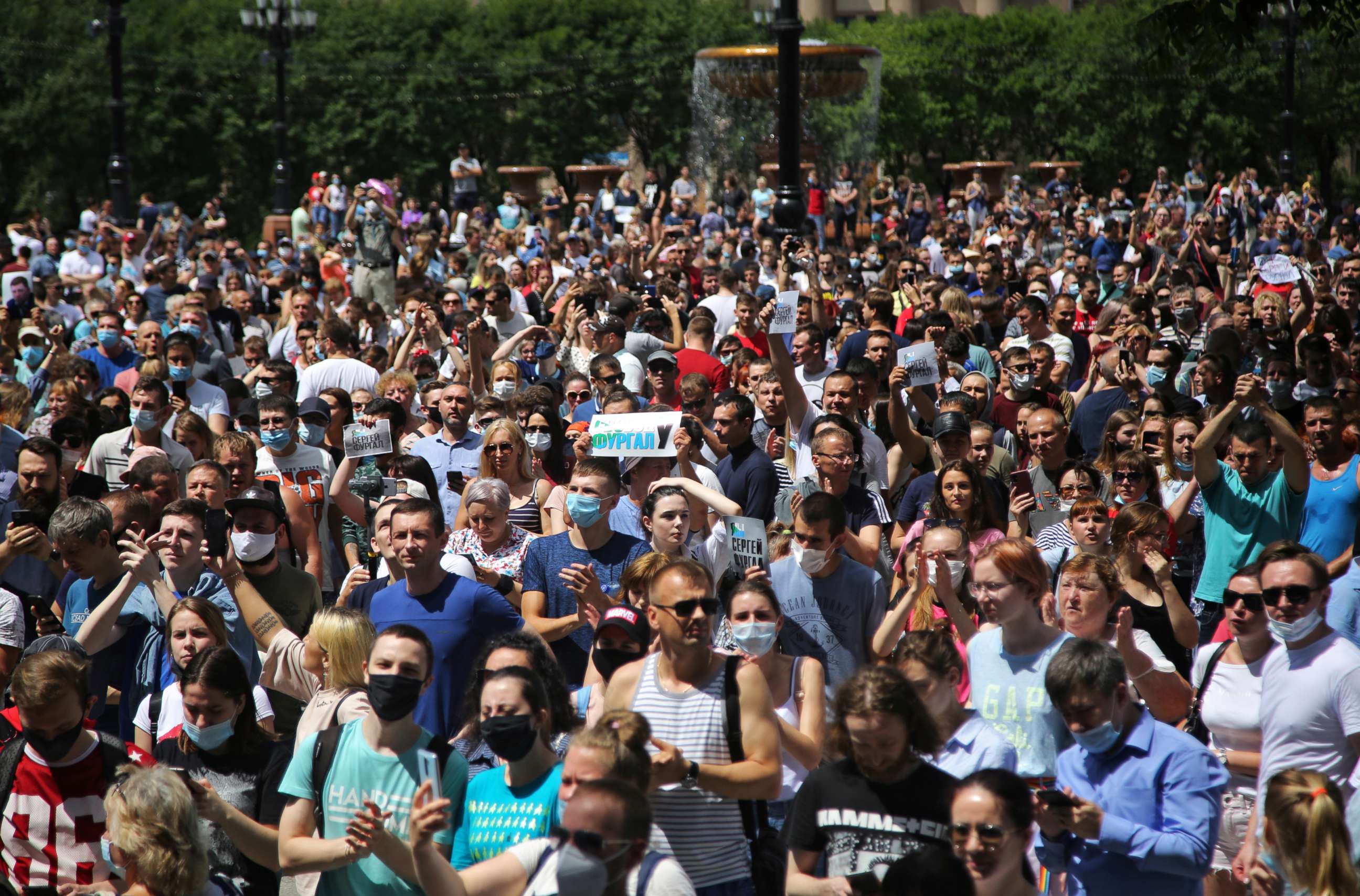Anti-Kremlin protests hit Far Eastern Russia amid crackdown
Tens of thousands joined protests triggered by the arrest of a popular governor.
Tens of thousands of people joined protests in Russia’s Far East last weekend in an almost unheard of display of opposition to President Vladimir Putin triggered by the arrest of a popular governor.
The protests in the city of Khabarovsk on the border with China were as large or bigger than almost any protests seen in Moscow in recent years, where opposition to Putin is normally concentrated.
The demonstrations demanding the release of the governor, who was arrested on murder charges, continued on Monday, though they were much smaller, with local media reporting that protesters numbered in the hundreds.
Large demonstrations in Russia’s regions are rare, and the surprise protests in the province far from Moscow point to a shift in public attitudes that is more unsettling for the Kremlin than would be protests in the capital by the liberal opposition that it paints as elite and unrepresentative.

The arrest that prompted the protests came amid a crackdown on Kremlin opponents that has followed a referendum on constitutional changes which will allow Putin to extend his rule until 2036.
Russia’s security services last week unleashed a wave of high-profile arrests and searches targeting opposition figures and journalists. A highly-regarded former journalist, Ivan Safronov, was charged with treason, sparking protests from leading newspapers. On Monday, security service officers tried to search the offices of democracy activist group Open Russia for a second time.
The arrests and raids in Moscow -- though they have caused an outcry among Russian liberal society -- have not provoked anything like the reaction to the arrest of Khabarovsk’s governor, Sergey Furgal.
Furgal is not a member of Russia’s dissident opposition, instead belonging to the far right Liberal Democratic Party (LDPR), long viewed as a token opposition party that helps the Kremlin create an illusion of political competition.

But he is one of the only heads of Russia’s regions not endorsed by the Kremlin. In 2018, he unexpectedly defeated the Kremlin-backed incumbent in a race in which he had been viewed as a paper candidate. His win then was seen by analysts as a rare rebuke to the Kremlin and a sign of rising discontent with Putin's ruling party, United Russia. Since then Furgal has grown more popular and is nicknamed "the people’s governor."
Last Thursday, Furgal was arrested in Khabarovsk, dragged by masked security services agents from his car and immediately flown to Moscow. He was charged with involvement in a series of murders from almost two decades ago. Furgal has denied the charges of murder and attempted murder.
Furgal is a former timber and scrap metal trader, both industries notorious for organized crime and violence in Russia’s chaotic early 2000s. But his sudden arrest now for the alleged crimes from years ago was widely viewed by critics as a political message from a Kremlin asserting its control.
Tens of thousands of people on Saturday marched in Khabarovsk and in other towns across the massive region that is 4,000 miles from Moscow. Police -- who often undercount demonstrators -- later estimated there were 10,000-12,000 protesters, while local media suggested there were around 40,000. Local activists and media said it was one of the biggest -- if not the biggest -- demonstration in the region's history.
Videos from the demonstrations showed people shouting "freedom" and "Moscow get out."

The protests delighted Russia’s liberal opposition. Alexey Navalny, its most prominent leader, tweeted Thursday "Khabarovsk we’re with you!" with video of the protests.
Russian state TV has largely sought to ignore the demonstrations. On Monday, Khabarovsk’s regional government issued a statement saying "we understand the feelings of people who came out" but that "two days on we see a dangerous tendency." The authorities alleged "non-systemic opposition" and "bloggers" among the demonstrators were now trying to provoke riots.
The unusual outbreak of popular discontent seemed to highlight a shift in opinion polls on Russians’ attitude toward Putin that show his popularity dipping recently. While still high, state polls show Putin’s approval rating has been eroding for the past two years and Russians have become more hostile to the authorities in general, fed up with a stagnant economy and perceived corruption.
The referendum two weeks ago that "reset" Putin’s presidential term count to zero was meant to underline his popularity. But the huge 78% vote in favor has been accompanied by accusations authorities pressured large numbers of people to vote and allegations from independent election monitors that there was "unprecedented" falsification.




